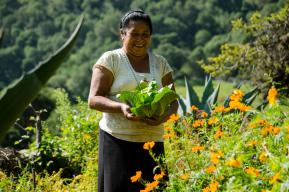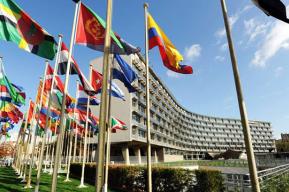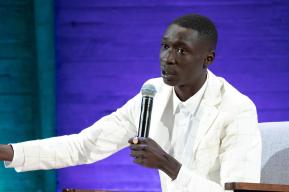UNESCO Lima, in alliance with the Museo de Arte de Lima (MALI) and the Universidad Antonio Ruiz de Montoya (UARM), announce the 6 winners of the fifth edition of the Gestoras Culturales Scholarship, whose 2022 call was focused on promoting diversity and inclusion to benefit more women from all regions of Peru.
The 6 winners of the fifth edition of the Gestoras Culturales Scholarship were chosen from a total of 109 applicants from different regions of Peru. In attention to the prioritized criteria, it has been recorded that of the 6 winners, 4 are based outside Metropolitan Lima (Junín, Arequipa, Puno and Ayacucho), 3 self-identify as Quechua, 2 recognize themselves as part of the LGTBIQ+ community, and 4 have a family burden.
They are:
| Name | Age & place | About |
|---|---|---|
| Maritta Carrión | (38 years old - Lima) | Theater educationalist, writer and oral storyteller |
| Noemí Espinoza | (35 years old - Junín) | Manager and cultural promoter |
| María Vargas | (36 years old - Lima) | Writer and stage artist |
| María Condori | (31 years old - Arequipa) | Sicuri and cultural promoter |
| Zulma Huaracallo | (27 years old - Puno) | Performing artist and cultural manager |
| Ingrid Cabezas | (38 years old - Ayacucho) | . |
The Scholarship, which in the four previous editions has registered 230 applications and has already awarded eleven cultural managers from Amazonas, Ucayali, Lima, Cusco and Junín, is given in the framework of the alliance between UNESCO in Peru, the Museo de Arte de Lima - MALI y la Universidad Antonio Ruiz de Montoya – UARM.
This initiative seeks to provide mechanisms that contribute to the reduction of inequality in women's access to functions and decision-making positions in the cultural sector.
The number of applications and the history of the lives of women working in the arts and culture in Peru challenge us to add more and more allies to expand the number of opportunities for women cultural managers in the country. It is everyone's responsibility to close the gender gap in the cultural sector. Congratulations to the winners!
The jury chose the candidates Carrión, Espinoza, Vargas and Condori, who were awarded the scholarship for the Specialization Program in Cultural Management at MALI: "We are very excited to receive the new scholarship recipients of the Specialization Program in Cultural Management at MALI and we are sure that they will come with very important proposals for the development of the sector, as well as for their particular environments. We will be attentive to their development and progress within our well-structured curriculum, so that, together with their other classmates, they can professionalize their passion and experience, making their cultural proposals sustainable. We thank UNESCO for giving us the opportunity to bring the program to more and new managers in the country, through a rigorous call for applications," said Luis Enrique Ramirez, MALI's Education Manager.
Meanwhile, candidates Huaracallo and Cabezas were the winners of the "Gestoras Culturales" Scholarship for the Diploma in Cultural Management at UARM. "We congratulate the winners and assume the challenge of accompanying them, providing them with the tools to carry out their projects. I am sure that the exchange of experiences between teachers and participants will enrich the journey," concluded Carina Moreno Baca, coordinator of the Diploma in Cultural Management at UARM.
Jury's criteria in choosing the winners
The jury unanimously chose Maritta Carrión Orderique “for having demonstrated sufficient capacity to replicate the knowledge acquired in favor of people with autism through art and culture. In addition, she is able to identify the various conditions of vulnerability and, based on that, implement management strategies that allow her to contribute to the closing of gaps through her projects. She also has extensive experience in the implementation of projects with a rights-based approach. Her ability to articulate with schools has allowed her to develop projects of greater scope. Finally, her work oriented to the common good has favored the strengthening of learning processes in schools and non-formal educational spaces”.
In addition, the jury unanimously selected Noemí Espinoza Belito “for having constantly fought against the barriers she has encountered in the cultural sector of her locality. Proof of this is her tireless search for training spaces and opportunities for professional and personal development to open the way for herself and others. In this way, despite the difficulties, she has managed to build a committed and innovative experience in the management and promotion of the cultural heritage of her region. Her integrating vision has allowed her to link heritage and gender as two pillars of her cultural work in favor of local development. Likewise, the impact of her work has transcended to different territories of the country, thanks to the intercultural approach she adopts in her projects, and her ability to articulate through cultural networks. Finally, the conviction that she manages to transmit in her work opens the way for other cultural managers, motivating them to promote projects in favor of their own life stories and their community”.
Likewise, María Inés Vargas Tunque was unanimously elected "for clearly expressing the strengths and weaknesses of the performing arts in each of the links of the value chain of this sector, in territories with little attention and public and private investment in the exercise of cultural rights, such as San Juan de Lurigancho. Her diverse experience in the sector has allowed her to articulate with cultural groups and local leaders for the development of community cultural initiatives aimed at the common good. In addition, her work with the body, intellect and emotions has favored her cultural practice, through the development of projects from an integrative approach. In addition, her ability to make personal and professional decisions to carve out her own path shows her confidence in her life's commitment to art as a means for local development. Finally, the self-recognition of her work, her dreams and convictions and her ability to transmit them constitute an opportunity to promote and encourage the work of more art and culture workers in our country”.
Likewise, Lucero Condori Rivera was unanimously elected “for having been able to find strength in her cultural practice to collectively fight against the strong manifestations of gender violence that her organization has faced. In addition, her resilience has led her to generate safe spaces for the exercise of cultural rights of the LGBTIQ+ community, which are very scarce in our country, especially in the field of intangible heritage. Likewise, as the bearer and transmitter of the Sicuri, she has managed to contribute to the safeguarding of this cultural manifestation of heritage value. Lucero has a broad vision of culture, understood not only as a space for pride and enjoyment, but also as an area of deep social fractures, wounds and misunderstandings that must be addressed. Finally, the intercultural approach applied to her projects has allowed her to create networks made up of women from different regions of the country, thus contributing to the strengthening of their identities”.
Furthermore, the jury unanimously chose Zulma Yasmín Huaracallo Apaza “for having been able to exercise cultural management despite the gender discrimination that affects women in their diversity within her community. In addition, she has faced a structural problem in Peru, such as racism based on language and place of origin. She has achieved this through art, where she has found a very powerful tool to fight and resist, motivating more people to bet on culture as a transversal axis of development. Likewise, as a psychology professional, she has managed to build bridges between art and mental health in her community. In this way, she has addressed complex and urgent problems such as school bullying and the emotional health of children and adolescents. Finally, her work vindicates youth as a key stage in the personal, cultural and social development of the country. At her young age, Zulma has managed to build a cultural experience full of learning, action and consolidation of her identity”.
Finally, Ingrid Cabezas Soto was also unanimously elected “for having chosen the path of art from a very early age, which shows a commitment to life and cultural rights. Much of her extensive experience in the cultural sector, ranging from creation, education to political advocacy, has been built without the opportunity to obtain academic degrees. In addition, his action has gone beyond his territory and has intervened in different provinces and districts of Ayacucho through cultural, recreational and educational projects. In addition to the work of creation and management, she has given her time to the arduous work of network articulation with the objective of influencing cultural public policies at the local level, thus contributing to the positioning of women in community decision-making spaces and to the strengthening of the country's cultural governance. She has set all these difficult and complex tasks in motion by vindicating aspects often considered as signs of weakness, such as tenderness, gentleness or the ability to dream. However, Ingrid has managed to assume these characteristics as banners for social transformation through culture”.
About the applicants
were young women between 15 and 29 years of age.
between 30 and 59 years of age.
between 60 and over.
secondary school or had incomplete higher technical education
higher technical education.
university studies.
university studies.
postgraduate degree.
On the other hand, with regard to socioeconomic level, 3% of candidates belonged to socioeconomic level A, 5% of candidates belonged to socioeconomic level B, 45% belonged to level C, 42% belonged to level D and 6% belonged to socioeconomic level E.
Finally, regarding the place of residence of the applicants, 62% of the total resided outside of Metropolitan Lima. In relation to the candidates' belonging to the LGBTIQ+ community, 31% recognize themselves as part of the community. As for the self-identification of the applicants, 6% self-identify as Afro-Peruvian women, and 40% as Quechua and Aymara.









